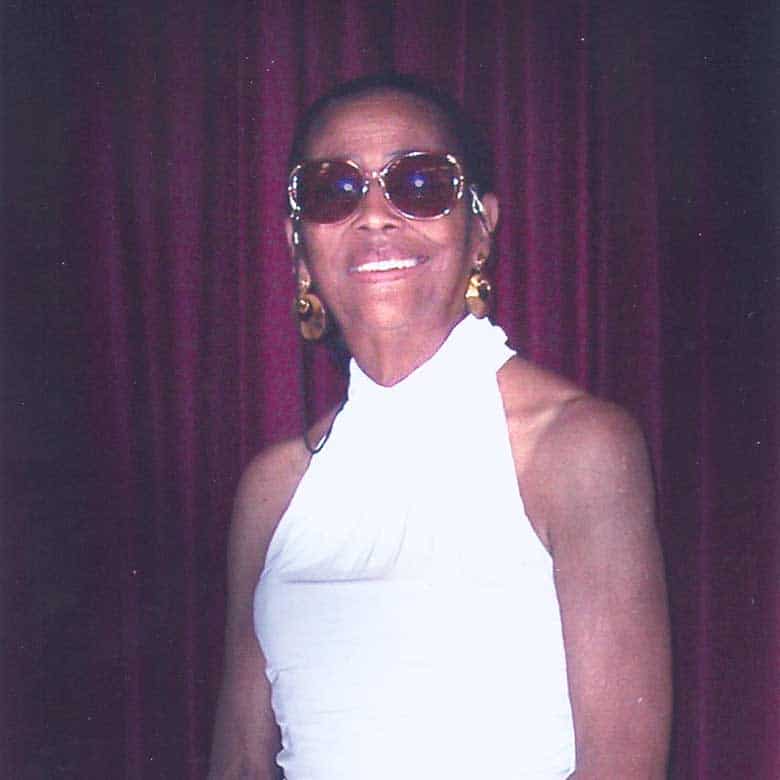
“Singing is Something I Have to Do“
By Karen Harper
Undine has kept one full-length, glittering, black, sequined gown. Dozens of others have taken their glamour to new closets via Goodwill just a few years ago. This elegant black gown embodies Undine’s bold and accomplished life as a singing artist, teacher, researcher, performer, and volunteer.
Undine began singing professionally at the age of eleven in a Funeral Home Quartet in Savanah, Georgia. Her high school music teacher decided she and her sister Jacquelyn were a perfect duet, contralto and soprano, and arranged many more gigs. When she was sixteen she was at an after-hours jam session when Lionel Hampton dropped in and offered her a job with his band. Her Mom said, “No!” Two years later the answer would be, “Yes.”
Here is how. Undine’s mother came to Long Beach to tend to Undine’s injured brother, Norman, in about 1949. Undine came out to help, but had to get back to college in Savanah. She was offered the most enticing way. Her Savanah piano teacher was now the pianist for the up and coming Big Jay McNeeley band experimenting with the LA Rock and Roll and Doo Wop sounds. The pianist promised her mother that he would be the perfect chaperone. Borrowing her first evening gown, she joined the Three Dots and a Dash singers. She was the Dash. The lead singer was Jesse Belvin who would write and record “Earth Angel” in 1954 and “Good Night My Love” in 1956. “The late great” Jesse Bevins became a dear friend. Their venues were Black night clubs and performance spaces en route to Atlanta. She remembers singing mostly ballads and standards such as “Don’t Blame Me.” Although the tour was cancelled in Fort Worth, Texas, she made it home with a nice paycheck and the knowledge that touring is more hard work than glamour.
Agnes Undine Verna Harris was born in Savanah, Georgia in 1931 to parents Faustine Williams and Horatio Preston Harris. She is the youngest of four siblings, Horatio Preston Harris, Jr., Norman Leroy Harris, and Jaquelyn Valerie Harris. She was lucky to be born into an African American family in the deep South with land, education, and careers. Her mother attended Spellman College; and her father attended Morehouse College, both prestigious Black colleges founded after the Civil War in the Atlanta area. Undine was raised at the Williams family homestead, a corner lot near the outskirts of Savanah owned by her grandmother, Idella. Undine says of her grandmother, “Mamma was my everything.” The double lot had a bountiful garden in the back with rows of peach trees and a special garden where Mamma picked baby vegetables just for Undine. The neighborhood was integrated with a Chinese family on one corner and a Jewish family on another, both owning markets in town.
Undine’s father was the pianist in his group called the Sonolia Orchestra when he lived in Atlanta. In Savanah, he had a plastering contracting business. He was talented and good looking. Women would not leave him alone; and he did not resist. The marriage did not last, so the homestead was run by strong women. When Horatio took his kids to the Harris homestead in South Carolina, they were not exposed to racism on the road. He had plenty of welcoming women along the way to provide snacks and restrooms.
Undine attended segregated schools “a good walk” across town where her mother and God-mother taught. The schools provided a quality education unlike many Black schools around the country. Undine graduated before the U.S. Supreme Court ruling against segregated public schools in 1954.
Educational expectations in the Williams/Harris family included college. All of Undine’s siblings have advanced degrees. Her eldest brother was a dentist in Washington, DC. Her sister was an English professor in Philadelphia. Norman, who became a paraplegic, made a good living as a basketball player in the Flying Wheels professional team, part of a league founded for wounded veterans after WWII. Undine started at Savanah State College (the first state sponsored Black college in Georgia) to major in music. She remembers an epiphany while walking across campus. She asked herself the question, “What does the world need?” She concluded that the world needs dynamic English teachers to inspire students. So, she changed her major.
Coming to Long Beach
While Undine’s brother was recovering from his injury at the Long Beach Veterans Hospital, Undine transferred to the newly founded California State College (now California State University), Long Beach to join her mother. Working her way through school included selling World Book encyclopedias door to door, providing childcare for the Wylder family, and much more. With a four-year degree in English Literature, a credential, and eventually an MA in Education, she was prepared for a stellar career in education. Not so easy–she first worked at Centennial High School in Compton where she and the District did not like each other. Then she took a position at Stephens Junior High School in the Long Beach Unified School District. She thrived under the mentorship of Dr. Garcia who became Superintendent. Stephens, on the West Side near Willow Street and Santa Fe Avenue, was “beautifully integrated.” Early in her career, she had Leland Vail as a student. He became her mentee “adopted son.” Dr. Vail is now a retired Professor of Music from CSULB and director of the music program at the historic First Congregational Church.
Family Life
Undine married and had her daughter, Carla, in 1957. She says her marriage lasted just a year and a half because her husband was no good; and she doesn’t remember his name. So again, the Harris women formed a household. Religious life is another important part of Undine’s story. One of her English professors encouraged her to investigate the Unitarian Universalist Church (UU). There she found an intellectual, artistic and spiritual home. Pianist Betty and Professor Bob Wylder were active at the church. Soon she and Betty were performing at clubs around town. Betty would arrange childcare for all the Wylder kids and Carla, so Undine was free to perform and collaborate at night clubs and events.
Most important, Undine met the love of her life at the UU church. Bill Wildman was a teacher in Garden Grove, an actor at the Long Beach Playhouse, and Undine’s biggest fan. They found each other in a community that readily accepted interracial marriages. Their marriage was a fulfilling adventure until Bill died of peritonitis which doctors should ave treated in time to save his life .
Balancing Teaching and Singing
Undine’s teaching career eventually included not only teaching English at Middle Schools Stephens and Marshall, but Social Studies, Music, and Psychology at the junior and senior high levels and at Long Beach City College. In 1975, Undine received an Outstanding Secondary School Teacher of America Award. In 1978, after Undine studied Japanese for two years, she was selected as the Teacher-Ambassador to Long Beach’s sister city. During her month in Yokkaichi, Japan, she gave speeches and sang in Japanese.
When Betty Wylder, Harriet Williams, Kaye Briegel, Kirsten Lagatree, and others were part of a Long Beach Women’s History Month Steering Committee in 1984, they decided to create a musical review called “Wonderful Women.” Of course, Undine was one of the ensemble singers along with Carol Feeney, Minnie Douglas, Sharon Alabashi, Penny Coffman, Gwen Percy, Margaret Preuss, and Ruth Wright.
That performance later inspired Undine and Karen Harper to develop a program on Harriet Tubman and Susan B. Anthony for Lowell Elementary School. It took some convincing because Undine did not think she liked young kids. Undine sang “Go Down Moses, ” one of the songs Harriet sang to let slaves know she was back on the plantation to lead them North. Undine discovered that being hugged and adored by youner students is quite nice.
Later, Undine presented a program at the Congregational Church on Negro Spirituals. Parishioners encouraged her to continue “spreading the word.” She applied for and received a grant through the Public Corporation for the Arts (PCA now the Arts Council for Long Beach) to research and create “The Negro Spiritual Revisited,” a full-length musical program to local Junior and Senior High Schools. After the grant was fulfilled, she booked performances at civic groups and colleges.
In 1990, The PCA selected Undine to receive their “Distinguished Performing Artist Award” for “The Negro Spirituals Revisited “ and her jazz career. Marilyn Horne received the award in 1989, and her beloved Leland Vail in 1996.
In the summer of 1992, for a lark, her husband Bill talked her into entering the Ms. California Senior America Pageant. On March 2, 1993, she was crowned Ms. California Senior. Two months later, in Nashville, she was First Runner-up in the National Ms. Senior America Pageant.
Next, Undine tackled another research and performance project she called “Unsung Notable Women” including Deborah Sampson, Sojourner Truth, Dr. Effie O. Ellis, Sacajawea, Dr.Selma Burke, and Alexa Cannady. The performance combined lectures and songs about this array of important women. he presented the “Unsung Notable Women” series to schools, colleges, and civic groups.
Along the way, Undine’s civic engagement has included important board commitments with the Bouggess White Foundation scholarships for Black youth, the National Council of Negro Women, Chair of the Blanch Collins Forum, and KLON Jazz Radio. She is also a Life Member of NAACP. Of course, the artist, teacher, and engaged citizen is also a theater supporter and attendee and a great cook. One of her favorites to prepare is Louisiana gumbo.
Undine’s singing career includes performing with Kelly LaMer, Duke Burrell, Art Hillary, Dwight Dickerson, Joe Cetani, the Tracy Wells Orchestra, Tom Nehr’s Big Band and performances around the world. She sang with Al Rossi Quartet in La Mirada at the Sportsman Lounge 1979-1987. She performed with the George Reed Trio at Mr. Roberts along with years at the Paradise Cafe with her own group. In 2008, Undine starred in a sellout Cabaret Series performance at the Long Beach Playhouse with one of her favorite longtime groups, the LLew Mathews Trio.
Undine says, “I have always worked for improvements in the community. I have championed many causes and received numerous awards. One of my most special days was in 2001 at the Burnett library. I was one of six African American leaders honored in the Share and Tell conference.”
Elegant, talented, dedicated, witty, Undine is about to turn ninety and has lived her years to the fullest, many in a black sequined gown.
Julie Bartolotto, Project Director


